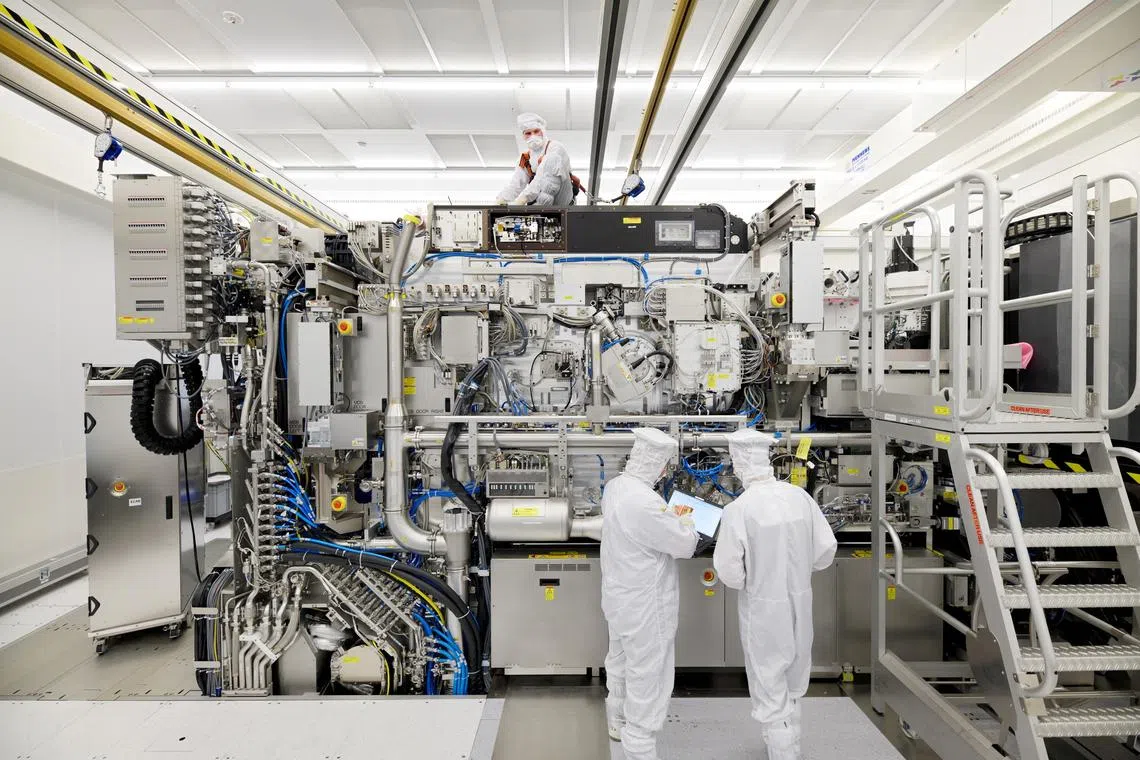Japan, Netherlands to join US in chip export controls on China
Sign up now: Get ST's newsletters delivered to your inbox

The Netherlands will expand restrictions on ASML Holding NV.
PHOTO: REUTERS
WASHINGTON – Japan and the Netherlands are poised to join the United States in limiting China’s access to advanced semiconductor machinery, forging a powerful alliance that will undercut Beijing’s ambitions to build its own domestic chip capabilities, according to people familiar with the negotiations.
US, Dutch and Japanese officials are set to conclude talks as soon as Friday US time
Officials from the Netherlands and Japan were in Washington on Friday discussing a variety of issues including emerging technologies, White House national security spokesman John Kirby said on Friday when asked about the export controls on semiconductor manufacturing.
National security adviser Jake Sullivan is leading those talks, Mr Kirby said.
Deputy Chief Cabinet Secretary Seiji Kihara, a government spokesman, said Japan would make “appropriate steps” based on the United States’ and other nations’ regulatory moves. He declined to comment further when asked about the report at a Friday afternoon media briefing.
The Netherlands’ Prime Minister Mark Rutte said on Friday that it is not clear whether his government will disclose the result of the ongoing talks with the US over new export restrictions for the semiconductor industry.
“Those talks have been going on for a long time and we’re not saying anything about it,” Mr Rutte said. “It’s really in doubt that if something comes out of them, that it will be very visible. We’ll have to see.”
The Netherlands is expected to expand restrictions on ASML Holding NV, which will prevent it from selling at least some of its so-called deep ultraviolet lithography machines, crucial to making some types of advanced chips and without which attempts to set up production lines may be impossible. Japan will set similar limits on Nikon Corp.
The joint effort expands on restrictions the Biden administration unveiled in October that were aimed at curtailing China’s ability to manufacture its own advanced semiconductors or buy cutting-edge chips from abroad that would aid military and artificial-intelligence capabilities. The three countries are home to the most important companies that produce equipment for manufacturing chips, including Netherlands-based ASML Holding, Japan’s Tokyo Electron Ltd. and the US’s Applied Materials Inc.
US equipment makers have complained that the unilateral action by the Biden administration allowed overseas competitors to continue to operate in one of the biggest markets for their products and undermined the aim of restricting China’s military advancements.
Tokyo Electron, which has sold chip-making equipment to China, reversed gains and fell about 1 per cent after Bloomberg’s report.
China’s chipmakers dropped too. Shanghai’s Semiconductor Manufacturing International Corp extended declines to as much as 2.1 per cent, while Hua Hong Semiconductor Ltd slid as much as 1.5 per cent.
In addition, China’s offshore yuan reversed earlier gains against the dollar, weakening 0.1 per cent to 6.7448 after the report. The currency had rallied to the strongest level in two weeks on signs of revived tourism and consumption during the Lunar New Year holidays. Thinner trading has also amplified moves in the foreign exchange market with mainland markets shut.
“This sets the next escalating move in the US-China tech war a bit more meaningfully and could weaken yuan sentiment a tad in the near-term,” says Ms Fiona Lim, a foreign-exchange strategist at Malayan Banking Berhard in Singapore.
China has fought back against the US effort. Beijing filed a dispute with the World Trade Organisation in December aimed at overturning the US-imposed export controls.
ASML CEO Peter Wennink told Reuters on Wednesday that Chinese chipmakers are already adjusting their plans to account for new restrictions seen as likely and he expects sales to China to be flat in 2023 while ASML group sales rise by 25 per cent.
ASML could see at least some of its US$2.4 billion (S$3.2 billion) in annual sales to China affected by the new limits.
Mr Wennink also said in an interview with Bloomberg News on Wednesday that the US-led export control measures against China could eventually push Beijing to successfully develop its own technology in advanced chipmaking gear.
“If they cannot get those machines, they will develop them themselves,” he said. “That will take time, but ultimately they will get there.”
Mr Rutte’s government has previously signalled it intends to reach some agreement with the US over export controls, but that it will not simply adopt the US rules.
Mr Rutte said on Friday that the talks were ongoing with “many countries” and that they are aimed at maintaining technological leadership, and preventing “the best technology be used in defence systems where you don’t want it”.
“But also how do you ensure at the same time that you don’t damage supply lines,” he said. BLOOMBERG, REUTERS


